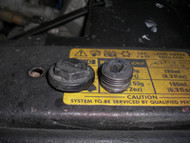Why is My Car Low on Coolant?
13th Apr 2016

Coolant plays a key role in the overall function of a car's engine. Often featuring a mixture of water and antifreeze (known as 50/50), it works by absorbing heat produced by the engine, transporting it away from the engine. While engine oil also helps to regulate temperatures, coolant is arguably the single most important element for this purpose. When coolant levels drop, the engine may overheat, resulting in costly damage.
Some people assume that coolant "evaporates" over time, which is why they are forced to refill their car's coolant on a regular basis. However, coolant systems are actually looped, meaning the car's water pump pumps coolant from the reservoir and into the engine. If you discover your car is low coolant or out of coolant, it's usually indicative of some underlying problem, which needs to be addressed promptly to prevent serious damage to the engine.
Faulty Radiator Cap
Sometimes the problem of low coolant is nothing more than a faulty radiator cap. Over time, radiator caps may wear down to the point where coolant is allowed to escape. For less than $10 bucks, you buy a new radiator cap to replace your existing one. Assuming this is the cause of your problem, no more coolant should escape once you've replaced it. Most auto experts recommend changing the radiator cap first since it's an easy, low-cost solution.
Related Reading: What Does a Radiator Cap Do?
Cracked Radiator
Another possible cause of low/no coolant is a cracked radiator. In addition to flowing through the engine, coolant also flows through the radiator. So if your car's radiator is cracked or otherwise broken, it may subsequently leak coolant. Replacing a radiator costs approximately $300 to $400, depending on the make/model vehicle and where you live.
Damaged Radiator Hose
Of course, a damaged radiator hose could also result in a coolant leak. If the hose through which the coolant flows to the radiator is broken, the coolant will escape. This is a relatively simple fix, however, involving the replacement of the damaged hose.
Blown Head Gasket
Among the most costliest reasons for coolant leakage is a blown head gasket. Found between the engine bock and cylinder head, had gaskets are designed to seal the engine's combustion process while preventing coolant and oil from mixing together. If your car has been overheating for a while, there's a good chance that one or more head gaskets are warped, in which case coolant may escape through the top.
Related Reading: Signs of a Blown Head Gasket

